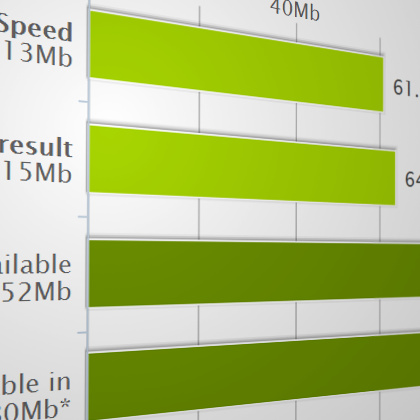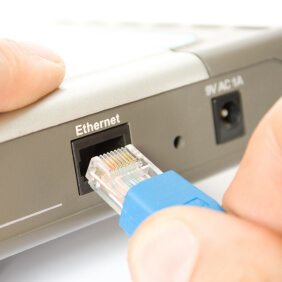What is Broadband?
 Broadband has long been the generic term for any kind of internet service in the UK which allows you access to the web, email, streaming TV and other online services at high speed.
Broadband has long been the generic term for any kind of internet service in the UK which allows you access to the web, email, streaming TV and other online services at high speed.
Broadband in the UK first emerged in the early 2000's and was provided through BT phone lines as an always on service meaning there was no need to connect and disconnect when you wanted to use it and was independent of your telephone service so you could use the internet and make phone calls at the same time.
The past few years have seen broadband develop in several ways leading to a number of different types of broadband, each with their own subtle differences from each other.
The most common types currently available are:
- ADSL - Short for Asymmetric Digital Subscriber Line, ADSL is the original type of broadband that was launched by BT and is delivered over a standard BT phone line. ADSL services require that you also have a working telephone service. This is the most common type of broadband in the UK. There are a few flavours of ADSL nowadays the most common being ADSL2+ which currently allows for speeds of up to 24Mbps, however the speeds you can achieve with all ADSL broadband types will depend on how far you live from your telephone exchange, the further away you are the lower the maximum speeds.
- LLU - Short for Local Loop Unbundling, LLU is very similar to ADSL but is provided by a broadband provider on their own equipment at the telephone exchange rather than using rented equipment from BT. Historically this meant that as well as costing less it could actually give higher speeds, however this is now no longer so at most exchanges since BT upgraded their ADSL services to match the speeds that LLU suppliers were offering.
- Cable - Cable broadband in the UK is the service provided in the vast majority of cases by Virgin Media. You don't hear their service referred to as cable broadband very much nowadays as they brand it as "Fibre optic". Cable broadband is actually provided over coaxial cables to your house, this does not lose speed with distance like ADSL so connection speeds tend to be higher and less variable than with ADSL. Cable broadband does not require that you have a working phone line.
- Fibre optic - Fibre optic broadband delivers broadband to your house (or very close to your house) over fibre optic cables which transmit the signal using light which is incredibly fast and does not degrade with distance. However many "Fibre optic" providers don't go all the way to your house and may do the last few hundred yards over more traditional BT phone lines or coaxial cables. Fibre To The Cabinet (FTTC) broadband is only fibre optic to your nearest BT street cabinet and then uses your normal phone line to finish the connection, and Virgin Media use a similar method finishing the connection with coaxial cable. The only true fibre optic to your house services are supplied using Fibre To The Property (FTTP), but these are currently very much in the minority of broadband supplies.
- Mobile - Mobile broadband uses the mobile broadband network to connect you to the internet. For most people this is not the fastest or cheapest form of broadband, but is very convenient for those on the move as it is by its very nature mobile and can be used anywhere there is a mobile phone signal. In some cases it may be the only type of broadband available in very remote areas which happen to have a good mobile signal.
- Satellite - Satellite broadband is the only type of broadband that is available anywhere in the country (as long as you can site the satellite dish without obstruction) and which connects to the internet via geostationary satellites. While it has universal availability the main drawback is cost, which tends to be significantly higher than other types of broadband in terms of both setup and running costs.
All the different types of broadband available here in the UK in combination mean that wherever you live and whatever your needs there will almost always be a solution for you.
When should I choose home broadband?
 When trying to decide if home broadband is the right choice for you there are a few things you need to consider:
When trying to decide if home broadband is the right choice for you there are a few things you need to consider:
- Location - Home broadband is a fixed service that is tied to your house. Although it's simple to make the service wireless within your own property (and indeed most providers will provide you with a wireless router to do just this) you can only use it at home.
- Phone lines - In most cases you'll also need to take a working phone line installed (the only real exception being Virgin Media's fibre optic broadband which you can take without a phone line if you wish, but these deals are not available in all areas).
- Speed - If speed is important to you then home broadband is the fastest type of broadband you are likely to be able to get for the vast majority of the UK.
- Download allowances - Similarly download allowances tend to be much more generous than for other types of broadband.
- Multiple users - If you wish to connect multiple computers and devices at the same time then home broadband is much simpler to setup for this than other types of broadband.
- Stability - Home broadband tends to be more stable than other types of broadband.
- Contracts - There are no pay as you go home broadband deals (but there are short contract deals available starting from 1 month, but they tend to be more expensive than longer contract deals).
At the end of the day if you expect most of your broadband use to be at home and you want reliability, fast speeds and to potentially share your connection amongst a number of devices at the same time then a home broadband connection is for you.
When should I choose mobile broadband?
 Mobile broadband is in many respects the polar opposite of home broadband when it comes to advantages and disadvantages:
Mobile broadband is in many respects the polar opposite of home broadband when it comes to advantages and disadvantages:
- Locations - You won't be restricted to using the connection just at home, you can use it wherever you can get a good mobile signal. This means if you move house you just take your connection with you, or if you frequently need broadband access out of the house (such as at college, the pub or client meetings) then you can get it.
- Phone lines - You won't need to have a separate phone line.
- Speeds - However you'll find that speeds are much lower in most cases than a home broadband connection.
- Download allowance - Download allowances are much less generous and charges for extra bandwidth can be expensive.
- Blocked services - Some mobile broadband providers block certain types of use like streaming video or audio.
- Multiple users - It's much more difficult to share a broadband connection unless you buy specialist mobile broadband routers.
- Contracts - For ad-hoc use pay as you go broadband deals are available.
If your broadband usage is light, and you can get a good signal in your property or you are frequently on the move then mobile broadband can be a replacement for home broadband. However in reality many people choose to have a home broadband and mobile broadband supply at the same time (usually by using PAYG deals for mobile broadband).
What should I look for when I compare home broadband providers?
 It can be difficult when comparing broadband deals against each other, but here's our handy checklist of things to look for:
It can be difficult when comparing broadband deals against each other, but here's our handy checklist of things to look for:
- Availability - Not all deals are available in all areas, so it's vital to use a postcode checker that can tell you what's available where you are. We have our own Ofcom approved postcode checker or try this alternative broadband checker.
- Download speeds - This is usually a key one for most people, it's the maximum speed that the deal offers. It's important to check the difference between what the deal offers and what you are likely to get at your house, again our postcode checker will help you with seeing the difference here.
- Download allowance - You'll find that this factor can vary a lot between different providers and different deals. Depending on how much you expect to use your connection and what you expect to use it for will determine how much download allowance you will need.
- Technical Support - Are you technically confident or more of a luddite? Some providers give far better levels of technical support than others, but technical support is a big cost for providers, so if you think you might need to make frequent use of support then expect this to be factored into the cost of your package.
- Contract Length - Some suppliers like to tie you into long contracts, sometimes up to 24 months long, whereas other can be much more flexible offering deals that are for only 1 month minimum terms (also known as no contract broadband). With all contract lengths pay attention to the small print to check for hidden charges.
- Equipment - Many deals come with free or subsidised routers, others expect you to provide your own.
- Freebies - It's more and more common to see enticements such as shopping vouchers or free gifts to try and persuade you to signup.
- Cost - cold hard money, this is what for most people is the most important factor. It's not always easy to work out the exact cost of a deal as there may be hidden charges or monthly prices that increase after an introductory period. Our postcode checker will help you understand the true cost of each deal as we work out the complete first year cost for you on every deal we list.
What should I look for when I compare mobile broadband providers?
 With mobile broadband you are going to have many of the same criteria to compare against as with home broadband, but there are a few subtle differences, so have a read through our list below:
With mobile broadband you are going to have many of the same criteria to compare against as with home broadband, but there are a few subtle differences, so have a read through our list below:
- Availability - It is much harder to work out availability for mobile broadband as local conditions can vary greatly with mobile (it can vary within a single property) and you will also need to consider multiple locations that you may frequently use the service. Each mobile broadband provider provides their own postcode checkers (you can find links to these in our mobile broadband guide), we'd suggest you look at these and check out the area that are going to be important to you.
- Download speeds - As with availability you will find that download speed is going to vary greatly depending upon where you'll find yourself most frequently using the service. Most providers will headline their deals with the very fastest speeds that can be achieved in areas which have the most up to date mast equipment. However if you live in a rural area don't expect to get such fast speeds. Again it's useful to check the individual suppliers postcode checkers.
- Download allowances - Mobile broadband deals quite often list a number of different download allowances which can be quite confusing, so it's important to be able to distinguish between them. The usual download allowance is that which uses the mobile phone network to send and receive data, wi-fi allowances is usage when you are in one of the providers hotspots. In major cities hotspots are much more readily available (most providers will give you an app or web page where you can search for your nearest hotspot) but these become less frequent the more remote an area you get to. Wi-fi allowances are often very generous (unlimited is quite common) whereas standard download allowances tend to much more restrictive. Unlimited downloads are almost impossible to find.
- Technical support - we generally find that mobile providers are much better at technical support than the average home broadband provider, however they still vary, so check what each provider offers in the way of support.
- Contract Length - there is a much wider variety of contract lengths available on mobile, with pay as you go deals starting from 1 day's access, up to deals of 24 months. Be sure to be aware of how long you are signing up for.
- Equipment - deals can in the simplest of cases provide you with just a SIM card (so called SIM only deals) and you will be expected to provide everything else yourself, many come with a dongle provided (a dongle connects to your laptop or PC via the USB card and this is what connects to the mobile network) and some may even provide you a free tablet.
- Freebies - much less common with mobile broadband are free offers to entice you, though they do happen occasionally, one to watch out for but not obsess over.
- Cost - yet again, cold hard cash is the most obvious thing to compare on. As with all services check for hidden costs and compare prices across multiple providers.
Should I consider a broadband bundle?
 A bundle is when you take your broadband service in conjunction with another product from the same provider, most commonly this will be a broadband and phone line together, but could also be broadband/phone/TV and in some cases a mobile phone connection as well.
A bundle is when you take your broadband service in conjunction with another product from the same provider, most commonly this will be a broadband and phone line together, but could also be broadband/phone/TV and in some cases a mobile phone connection as well.
The advantages of a bundle is that they can provide extremely good value for money in many cases, most of the cheapest prices quoted for broadband are for suppliers who require that you bundle up the phone supply with them.
However for some customers it may not always be best to bundle as it can restrict you from getting the most suitable service for all your needs.
But for the vast majority of people a bundles are a great way to save money and get a great deal, so if price is you major motivating factor when choosing a provider then you should give serious consideration to bundles.
For more information see our up to date list of broadband bundles.
How much data allowance will I need?
 Download allowances can often be quite a mystery to most people as it's almost impossible to try and understand what a megabyte or gigabyte actually relates to.
Download allowances can often be quite a mystery to most people as it's almost impossible to try and understand what a megabyte or gigabyte actually relates to.
It can be simpler to start off by working out what kind of broadband user you are from the typical types below:
- Light User - You use the internet infrequently and generally just for catching up on emails and doing a little web browsing. You hardly ever watch video or listen to audio on the internet. You will not need a very large data allowance at all and will most likely need less than 1 gigabyte (1GB) of allowance per month.
- Medium User - You use the internet most days at home, mainly for emails and web browsing but with occasional use of video streaming like BBC iPlayer or Youtube. You might use Skype once in a while to connect with friends or relatives. You probably don't need an unlimited download allowance, but you'll certainly need more than a light user. Somewhere between 5GB and 15GB should be enough per month.
- Heavy User - You use the internet at home a lot, and you watch a lot of streaming video (iPlayer and Youtube) and audio. You use services such as Skype frequently for audio and video calls. You download lots of movies and games. We'd suggest you go very high (40GB or more) or unlimited download allowance.
- Gamer - You love online gaming and spend many hours a month on your favorite online games. You are frequently downloading new games or patches and mods to existing games. You may make use of in game voice chat. You will need a large (20GB or more) or unlimited data allowance.
- Household - You are a family of shared house with more than one or two regular internet users. You could be a combination of all the different types of user between you and all on one connection. We'd suggest you go very high (40GB or more) or unlimited download allowance.
Hopefully this will help you make a informed choice when it comes to choosing the right download allowance for you. It's worth reading the small print on download allowances, especially unlimited broadband deals as there may be restrictions on that usage.
How can I tell if a provider is good to sign up with?
 When considering signing up with a new broadband provider, as with any service that locks you into a potentially long contract, it's key to look at feedback from real customers.
When considering signing up with a new broadband provider, as with any service that locks you into a potentially long contract, it's key to look at feedback from real customers.
We have a detailed broadband reviews section and mobile broadband reviews which covers a huge range of providers full of warts and all reviews from real customers.
When reading reviews it's important to remember that with some providers having millions of subscribers that there are always likely to be occasions when for some customers things go wrong. It's therefore important to look for common themes cropping up and also to look at the reviews for a number of suppliers before making your mind up.
How do I switch providers?
 Switching broadband provider is now simpler than ever due to regulations put in place and enforced by Ofcom (the UK government agency which regulates broadband providers).
Switching broadband provider is now simpler than ever due to regulations put in place and enforced by Ofcom (the UK government agency which regulates broadband providers).
The first step is to see if you are still in your minimum contract period with your current provider, if you are then you may have to pay a penalty to quit your contract (but this is usually much less than the cost of staying with the provider), you may also have to pay a charge to keep any "free" items such as routers as these are really paid for over the life of your standard contract.
If your minimum contract period is over then you shouldn't have any fees to pay to leave your current supplier.
The next steps will depend on which type of broadband you are switching from and to:
Switching between suppliers who use BT phone lines - You next need to call your broadband provider and request your MAC (Migration Authorisation Code), we have a list of providers phone numbers here to find the number you need to call. It's a simple process to get your MAC code and once you have it you can then move onto the next step.
Once you have your MAC code you then contact your new supplier and provide them your MAC code, they will then be able to process your move to them for you with no hassle and an absolute minimum of downtime (usually less than 30 minutes).
Switching from Cable broadband to BT phone line broadband - As your new broadband provider will be using a BT phone line to supply you rather than cable then you can simply sign up and then once you are installed you can then cancel your cable contract, you won't need a MAC code. It's worth asking your new supplier if they can arrange a BT line for you as this may be cheaper than asking BT to do it for you. This is particularly important if your new supplier will be providing you a broadband and telephone bundle.
Switching from BT phone line broadband to Cable broadband - This is simply the reverse of the cable to BT route, so you simply order your cable supply and once fitted simply cancel your BT line and supplier, no need for MAC codes.
Switching mobile broadband providers - Yet again this is very simple, you just need to wait for your current contract to end and then sign up with your new supplier. There's nothing to stop you paying for multiple broadband deals at the same time if you don't want to be without a working connection at anytime.
For more information on switching broadband suppliers see our full broadband switching guide.
We can also help you through the entire switching process if you use our telephone switching service on 0800 840 5379 and take care of it all for you.
Can I use my mobile broadband connection abroad?
 It's a common question and the simple answer is yes, but beware of the cost! There have been several horror stories of people taking their mobile broadband dongle abroad and then running up bills of tens of thousands of pounds in the space of a few days due to extremely high roaming charges. Most providers have since changed how they allow people to use their connection when abroad to try and prevent such high bills (and negative press) but charges do still tend to be very high.
It's a common question and the simple answer is yes, but beware of the cost! There have been several horror stories of people taking their mobile broadband dongle abroad and then running up bills of tens of thousands of pounds in the space of a few days due to extremely high roaming charges. Most providers have since changed how they allow people to use their connection when abroad to try and prevent such high bills (and negative press) but charges do still tend to be very high.
If you do plan on using your connection abroad then it's always safest to call your provider up first and confirm what the roaming charges are where you are going and see if you can pre-pay for some data or have a cap placed on your account so you don't overspend.
There are some specialist deals for frequent business travellers, but these don't tend to be cheap.
A simple tip for mobile broadband abroad is to simply buy a pay as you go SIM from a local mobile provider when you arrive abroad, this will usually give you much much better rates and as it's pay as you go there will be no unexpected bills at the end of your holiday.
What affects my broadband speed?
 One of the most confusing aspects of many types of broadband connection is that the download and upload speeds can be affected by a great deal of factors. Heres a few of the main ones:
One of the most confusing aspects of many types of broadband connection is that the download and upload speeds can be affected by a great deal of factors. Heres a few of the main ones:
Home Broadband
- Distance from the telephone exchange (or in the case of some fibre optic deals distance from the street cabinet). The ability of copper based telephone lines to hold a reliable speed is reduced the further you live from your telephone exchange. This is why speeds in rural areas are usually much lower than those in urban areas where houses tend to be located closer to the telephone exchange.
- Internal electrical interference, such as poor internal telephone wiring and faulty or poorly shielded electrical equipment can have a negative impact on broadband speeds. A common cause of such interference at Christmas time are cheap flashing light decorations.
- Viruses and Malware, an infected machine can overload your broadband connection as it connects to the outside world trying to propagate itself making your broadband connection seem much slower than usual.
Mobile broadband
- Local mast capabilities, depending on the capabilities of your nearest mobile phone mast you may find lower speeds as not all are enabled for faster types of connection types such as 3G, so in an area with no 3G signal your connection will degrade to a slower type.
- Local usage, if many people in the same area are connecting to the same local mast and using the internet at the same time then the amount available to each user will decrease and therefore result in lower speeds.
- Signal strength, if you are in a well shielded location such as in a house with very thick walls then you will find that the signal strength is much weaker and your connection speed will be much lower.
Satellite broadband
- Satellite broadband speeds have a much greater ping (ping is also known as lag, this is the time it takes to get a response from a connection after making a request) due to the signal having to travel to the satellite and back to earth which is a much greater distance than other broadband types. Once connections are made speeds can be very fast, but this initial ping makes some types of activity seem rather slow, such as online gaming.
- Adverse weather, such as heavy rain or snow can affect the satellite signal, as anyone who has tried to watch satellite TV in a heavy blizzard can understand.
For more on what affects broadband speeds and how to get the most out of your connection you should see our complete guide to broadband speeds and our tips to speed up your broadband connection.
Can I get anything free with my broadband?
 With fierce competition between providers to get your custom there are more and more deals that come with freebies to try and encourage you to sign up with them rather than their rivals.
With fierce competition between providers to get your custom there are more and more deals that come with freebies to try and encourage you to sign up with them rather than their rivals.
- Free tablets - There are many mobile broadband deals with tablets available from most of the mobile broadband providers. Some offer free tablets with no additional upfront costs. These usually come with quite long contracts.
- Free routers - Broadband deals with free routers are the most common deal freebie.
- Gift vouchers - It's common now to see some deals throw in gift vouchers for high street stores or gifts such as wine vouchers.
With everything listed as "free" on any contract it's important to remember that ultimately the cost of the free item is really covered in your overall contract cost. It's often worth shopping around and seeing if it might not be cheaper to just buy the item yourself and then sign up with a cheaper deal without the freebie.
Can I get free broadband anywhere?
 If you have a wifi enabled phone or laptop then there are now plenty of places on the high street that will give you free broadband access via wi-fi. Notably pub chains Wetherspoons and McDonald's restaurants are usually the easiest to find, but you will also find many independent cafes, restaurants and pubs will offer a free broadband connection to help entice you in.
If you have a wifi enabled phone or laptop then there are now plenty of places on the high street that will give you free broadband access via wi-fi. Notably pub chains Wetherspoons and McDonald's restaurants are usually the easiest to find, but you will also find many independent cafes, restaurants and pubs will offer a free broadband connection to help entice you in.
If you are staying away for the night then if you look around it's not uncommon now to find hotels which offer free broadband to their guests.
For those who don't have a laptop of wi-fi enabled phone then search out the nearest public library as these will usually have computer terminals connected to the internet to provide free broadband access.
How do I find out what broadband providers are available in my area?
As not all providers and deals are available in all areas it's really important to use a broadband comparison tool that will show availability for your exact area. You can use our broadband postcode checker which is approved by Ofcom (who are the government agency which regulates broadband in the UK) and will show you what deals are available in your area in an impartial and transparent way. Our checker can also tell you what sort of broadband speeds you should expect to get in your area (Tip: enter your phone number as well as your postcode for the most accurate results).
We take your privacy seriously and we never share your personal data with any third parties, nor will we ever call you using any phone number data you may supply.
How do I find out if my broadband speeds are up to scratch?
 We know from feedback from broadband customers that the most common complaint is that their connection speeds are too slow and they are not getting what they paid for. We commonly get people looking for the fastest broadband deals. It used to be the case that checking broadband speeds was difficult, but now it's quick and easy to check your speed by using our broadband speed test.
We know from feedback from broadband customers that the most common complaint is that their connection speeds are too slow and they are not getting what they paid for. We commonly get people looking for the fastest broadband deals. It used to be the case that checking broadband speeds was difficult, but now it's quick and easy to check your speed by using our broadband speed test.
Our tool will test the upload and download speed of your broadband connection and give you an accurate measure. The test takes around 30 seconds, and you are welcome to run the test as many times as you wish.
If you give us your postcode when you run a test we will also be able to report to you on what kind of speeds you should be getting in your area so you can compare this to your results.
Every month we publish a league table of popular suppliers average speed (and we have been doing so since May 2008 making us the best source for historical broadband speeds in the UK).
How does broadband work technically?
 In simple terms broadband through your copper phone line works by using some of the frequencies on the line that are not used for voice calls. Voice calls use a narrow band of frequencies and broadband uses a broad band of frequencies, hence the name. The reason you need microfilters if you have broadband is to keep some of these broadband frequencies being audible when you make voice calls.
In simple terms broadband through your copper phone line works by using some of the frequencies on the line that are not used for voice calls. Voice calls use a narrow band of frequencies and broadband uses a broad band of frequencies, hence the name. The reason you need microfilters if you have broadband is to keep some of these broadband frequencies being audible when you make voice calls.
True fibre optic broadband uses fibre optic cables connected to your property to send data as a series of digital information encoded in beams of light. Some fibre optic services don't actually use fibre optic all the way to your house, but instead terminate the fibre in cabinets on the street close to your house and then send the data the remaining distance over standard twisted copper or coaxial cables. As the distance not covered by fibre optic cable is so short they can still provide very fast speeds and the Advertising Standards Authority still allows them to describe their services as fibre optic.
Mobile broadband uses microwaves to send data between your mobile device and mobile phone masts much in the same way that they work for mobile phone calls. Once at the mobile phone mast the data is then usually connected to the rest of the internet over a wired network, but in more remote areas there might be more wireless "hops" before it hits a wired network.
Satellite broadband beams data to and from a satellite dish on your house all the way up to a satellite in geostationary orbit which then beams the data back down to an earth station where it connects up to the rest of the internet.
That's about as technical a description as we find most people need to know, however if you are more technically inclined then we'd suggest you look at the following resources on Wikipedia which delve further into the science behind broadband.
Who are broadband.co.uk ?
We are a site founded way back in 2004 dedicated to helping UK consumers get the most out of their broadband connection in a number of ways:
- Educate - We aim to provide the best guides to help you with all aspects of getting setup with, understanding and then getting the most out of your broadband connection.
- Protect - We are on your side when making sure that broadband suppliers provide you with the service you are paying for with free access to tools such as our broadband speed test.
- Inform - We maintain a huge database of the UK's broadband deals and detailed local information as to broadband capabilities for every postcode and telephone number in the UK with free access for all to find the right deal for them.
- Help - We are here to help with any broadband query you have and you can contact us by phone or email with any questions you have.
We are completely independent of all broadband providers and we are members of a number of leading industry bodies such as the Internet Service Providers Agency (ISPA) and the Broadband Stakeholders Group (BSG).
We are also unique in that we are one of the very few broadband information websites that has reached the standard required to be accredited by Ofcom, the government agency that regulates broadband provision in the UK.
Over the years we've helped millions of people to understand what broadband is, how they can use it, how to find the best deals and how to make sure they are getting what they paid for. We look forward to helping many millions more in the future.
What does the future hold for broadband in the UK?
 The past decade has seen broadband in the UK advance considerably, average speeds are now 30 times faster than they were originally (from 0.5Mbps to over 15Mbps now) and the very fastest suppliers in some cases offer speeds of 1Gbps, thats 2,000 times faster than 10 years ago. However if you live in a rural area some of these huge speeds are just a distant fantasy, this is the so called "Rural broadband divide" and we expect that the next ten years will hopefully see this gap in speeds will be reduced as a combination of government and private investment will bring improved speeds to more and more rural areas.
The past decade has seen broadband in the UK advance considerably, average speeds are now 30 times faster than they were originally (from 0.5Mbps to over 15Mbps now) and the very fastest suppliers in some cases offer speeds of 1Gbps, thats 2,000 times faster than 10 years ago. However if you live in a rural area some of these huge speeds are just a distant fantasy, this is the so called "Rural broadband divide" and we expect that the next ten years will hopefully see this gap in speeds will be reduced as a combination of government and private investment will bring improved speeds to more and more rural areas.
The real key for home broadband will be the provision of more and more fibre optic broadband across the nation and we hope to see this grow.
With mobile broadband it is going to be a combination of new technologies and infrastructure development from the mobile carriers that will be the real driver. Already providers are releasing plans of how so called 4G mobile broadband will be rolled out and this will increase speeds and reliability for customers willing to upgrade their equipment to take advantage. Again the more rural areas won't be the first to enjoy this technology.
So in a nutshell we see more fibre, faster mobile and a general rise in download speeds ahead.
Who regulates broadband in the UK?
Ofcom is the government body which regulates broadband provision (both fixed line and mobile) in the UK. They also are responsible for regulating TV, Radio, telephone, postal services and any use of wireless devices in the UK.
We work closely with Ofcom and our price comparison calculator and our telephone helpline are both officially accredited as being accurate, up to date and transparent. You can read more about our Ofcom accreditation here.
